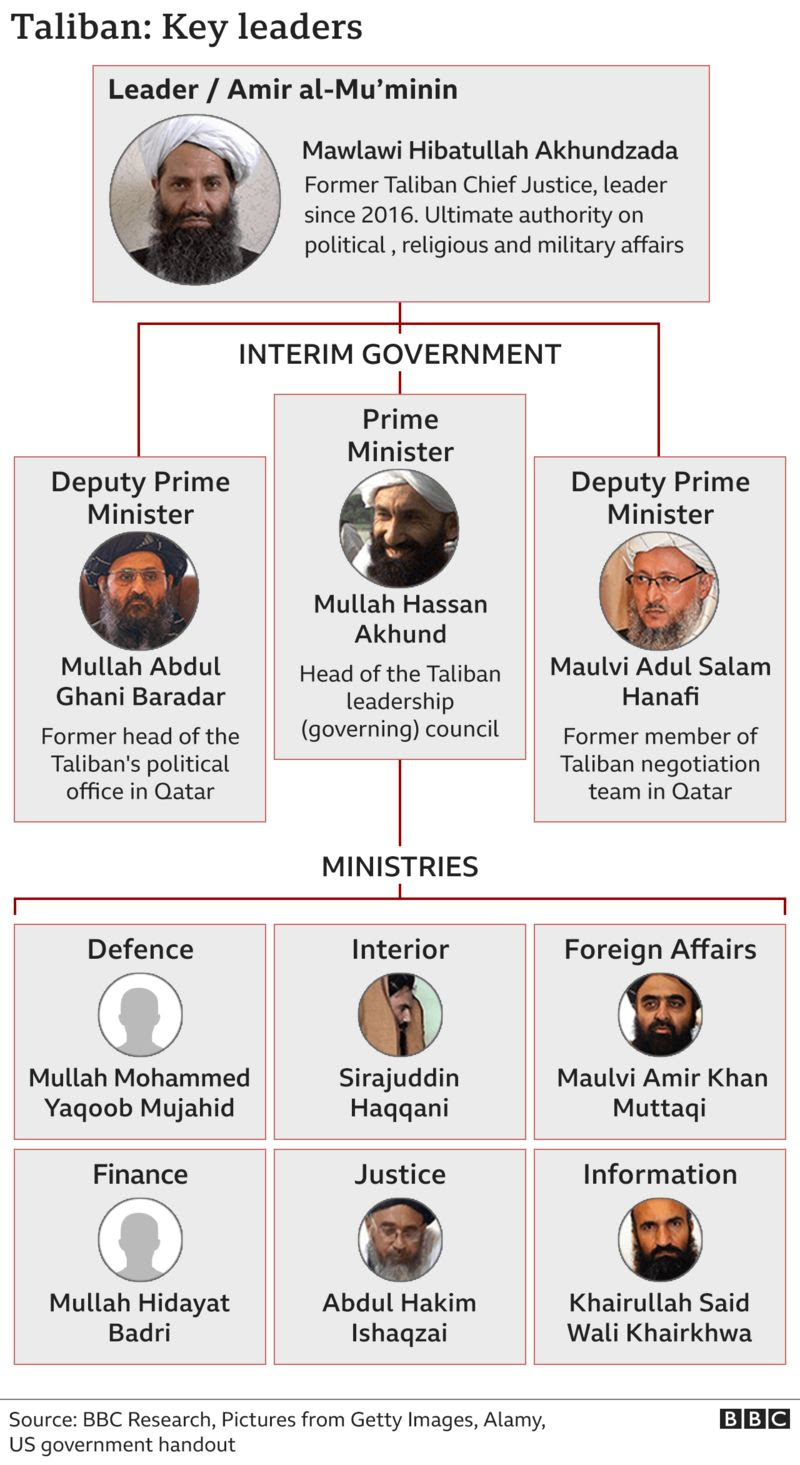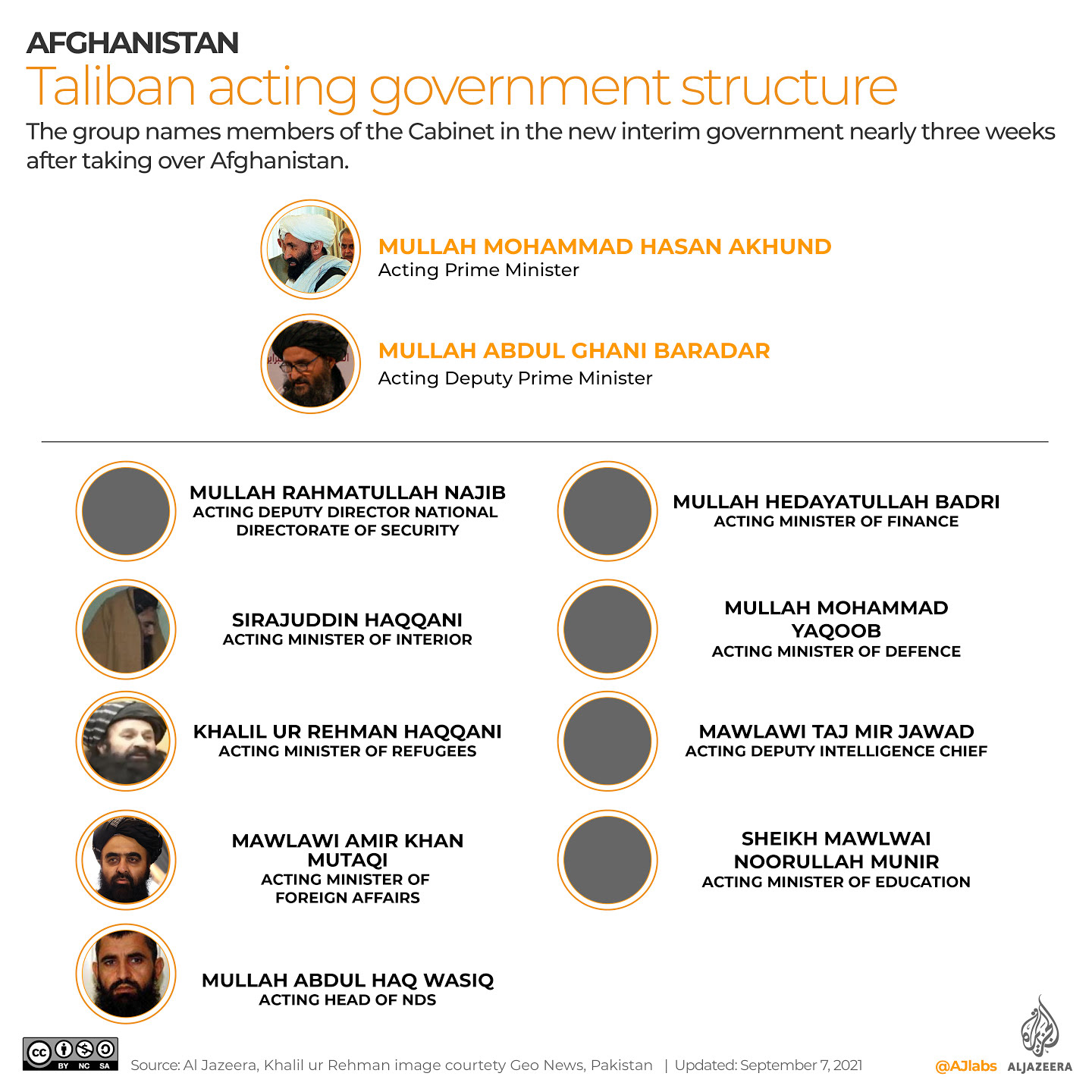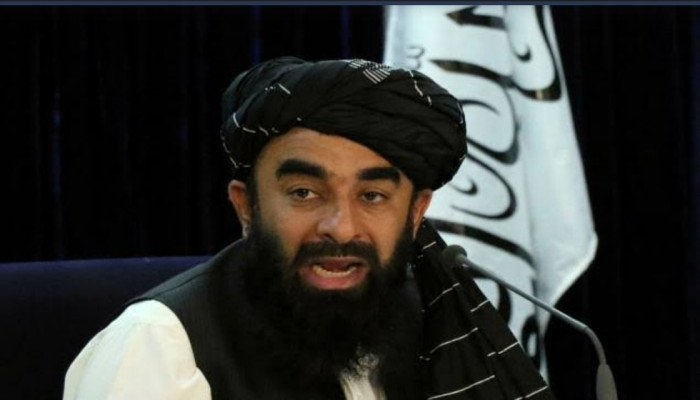17 of the 33 Cabinet members of Taliban government are on UN terror blacklist
- In Reports
- 10:23 PM, Sep 08, 2021
- Myind Staff
The Taliban announced the interim government in Afghanistan, declaring the country an "Islamic Emirate".
The cabinet members consist of many Taliban figures that are considered hardliners. The list announced by chief spokesman Zabihullah Mujahid was dominated by members of the group's old guard, with no women included. Around 17 out of 33 cabinet members are on the UN terror blacklist.
Mullah Mohammad Hasan Akhund – a senior minister during the Taliban’s brutal and oppressive rule in the 1990s – was appointed interim prime minister, while the group’s co-founder Abdul Ghani Baradar, who oversaw the signing of the US withdrawal agreement in 2020, was appointed deputy prime minister.
Appointed to the key post of interior minister was Sirajuddin Haqqani, one of the founders of the Haqqani network, classified as a “terrorist” group by Washington. He is one of the FBI’s most wanted men due to his involvement in suicide attacks and ties with al-Qaeda.
Molavi Muhammad Yaqoob Mujahid, son of Mullah Omar has been appointed as Minister of Defense, while Molavi Amir Khan Muttaqi, a Taliban negotiator in Doha as Minister of Foreign Affairs.
Here is the list of all interim heads of key security and service ministries, some of their deputies and other chief executives are announced as follow:
1. Alhaj Mullah Mohammad Hassan Akhund Acting Prime Minister
2. Mullah Abdul Ghani Baradar Deputy Prime Minister
3. Maulvi Abdul Salam Hanafi Deputy Prime Minister
4. Maulvi Mohammad Yaqub Mujahid Acting Minister of Defense
5. Alhaj Mullah Sirajuddin Haqqani Acting Minister of Interior
6. Maulvi Amir Khan Mottaki, Acting Minister of Foreign Affairs
7. Mullah Hidayatullah Badri, Acting Minister of Finance
8. Sheikh Maulvi Noorullah Munir Acting Minister of Education
9. Mullah Khairullah Khairkhwa, Acting Minister of Information and Culture
10. Qari Din Hanif, Acting Minister of Economy
11. Sheikh Maulvi Noor Mohammad Saqib Acting Minister of Hajj and Religious Affairs
12. Maulvi Abdul Hakim Sharia, Acting Minister of Justice
13. Mullah Noorullah Noori Acting Minister of Borders and Tribal Affairs
14. Mullah Mohammad Yunus Akhundzada, Acting Minister of Rural Rehabilitation and Development
15. Sheikh Mohammad Khalid, Acting Minister of Preaching and Guidance, and Amr Bill Maruf Wa Anil
Munkar
16. Mullah Abdul Manan Omari, Acting Minister of Public Works
17. Haji Mullah Mohammad Issa Akhund Acting Minister of Mines and Petroleum
18. Mullah Abdul Latif Mansoor Acting Minister of Water and Power
19. Mullah Hamidullah Akhundzada, Acting Minister of Aviation and Transport
20. Maulvi Abdul Baqi Haqqani, Acting Minister of Higher Education
21. Maulvi Najibullah Haqqani, Acting Minister of Communications
22. Haji Khalil-ur-Rehman Haqqani, Acting Minister of Refugees
23. Mullah Abdul Haq Wasiq, Acting Director-General of Intelligence
24. Mr. Haji Mohammad Idris, Acting Director-General of Afghanistan Bank
25. Maulvi Ahmad Jan Ahmadi Acting Director-General of Administration
26. Mullah Mohammad Fazil Mazloom, Deputy Minister of Defense
27. Qari Fasihuddin Chief of Army
28. Mr. Sher Mohammad Abbas Stanekzai Deputy Foreign Minister
29. Maulvi Noor Jalal, Deputy Minister of Interior
30. Mr. Zabihullah Mujahid, Deputy Minister of Information and Culture
31. Mullah Taj Mir Jawad First Deputy Director General of Intelligence
32. Mullah Rahmatullah Najib, Deputy Director-General of Intelligence
33. Mullah Abdul Haq Akhund Deputy Minister of Interior in Counter Narcotics Affairs


The Taliban seized control of most of Afghanistan more than three weeks ago, ousting the previous elected leadership.
The announcement of the acting cabinet is a key step in the formation of a permanent Taliban government. The new leadership will face significant challenges, not least stabilising the country's economy and gaining international recognition.
The Taliban have previously said they wanted to form an inclusive government. However, all of the cabinet ministers announced on Tuesday are already established Taliban leaders, and no women were included.
The government announcement came on the day Taliban fighters fired shots at a protest of hundreds of people, mainly women, in Kabul.
Footage from the scene showed people running to safety, while heavy gunfire - warning shots fired by militants - was heard in the background.
The Taliban now claim full control of Afghanistan, saying they have defeated resistance fighters who were holding out against them in the Panjshir valley, north of Kabul.
The National Resistance Front of Afghanistan (NRF) said in a statement that it "considers the announcement of the Taliban's caretaker cabinet illegal and a clear sign of the group's enmity with the Afghan people".
Reacting on the new interim government of Taliban, the US said it was concerned about the “affiliations and track records” of some of the people named by the Taliban to fill top posts in Afghanistan’s new government.
“We note the announced list of names consists exclusively of individuals who are members of the Taliban or their close associates and no women. We also are concerned by the affiliations and track records of some of the individuals,” a spokesperson for the Department of State said.
“We understand that the Taliban has presented this as a caretaker cabinet. However, we will judge the Taliban by its actions, not words.”
Farhan Haq, a spokesman for the UN, said the global body does not engage in acts of recognition of governments.
“That is a matter that’s done by member states, not by us. From our standpoint, regarding today’s announcement, only a negotiated and inclusive settlement will bring sustainable peace to Afghanistan,” he told reporters.
The European Union said the “caretaker” government unveiled by the Taliban in Afghanistan failed to honour vows from the new rulers to include different groups.
“Upon initial analysis of the names announced, it does not look like an inclusive and representative formation in terms of the rich ethnic and religious diversity of Afghanistan we hoped to see and that the Taliban were promising over the past weeks,” an EU spokesperson said.
Pramila Patten, the head of the UN women’s agency said the Taliban’s exclusion of women in Afghanistan’s new government calls into question its commitment “to protect and respect the rights” of women and girls.
She called women’s political participation “a fundamental prerequisite for gender equality and genuine democracy” and said that “by excluding women from the machinery of government the Taliban leadership has sent the wrong signal about their stated goal of building an inclusive, strong and prosperous society”.
Whereas Beijing said it welcomed the end of “three weeks of anarchy” in Afghanistan with the establishment of a new interim government in Kabul, calling on the Taliban to restore order in the country.
China has been scathing about the American withdrawal, which it criticised as ill-planned and hasty. On Wednesday it said the new government would help bring stability.
Image source: Financial times







Comments